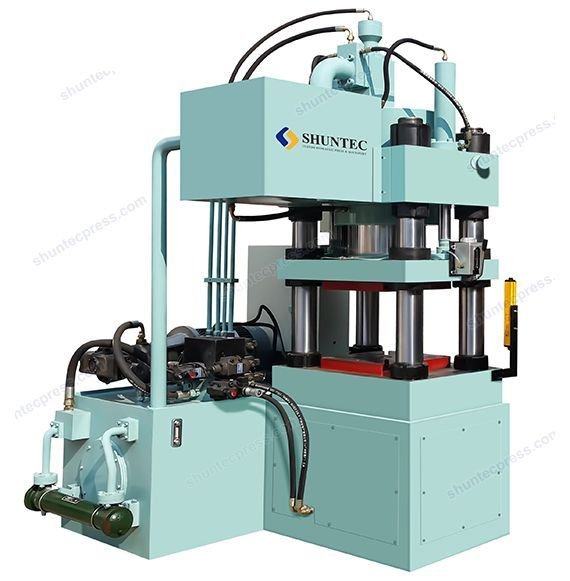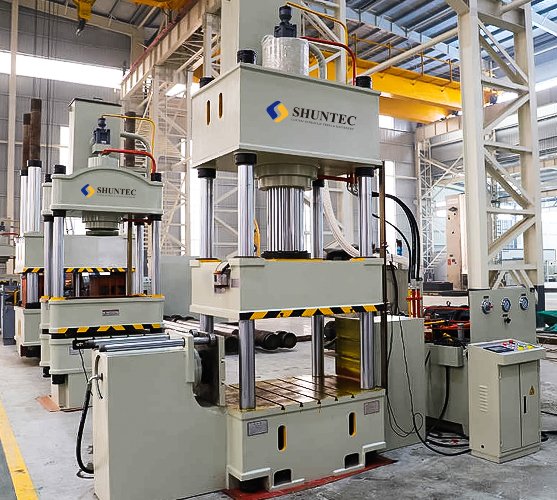Introduction
A hydraulic press, a simple yet indispensable piece of machinery, has numerous applications across industries. Its working principle is based on Pascal's law, which states that when pressure is applied to confined fluids, the pressure change occurs throughout the entire fluid. To ensure efficient and safe operation, one crucial aspect that must be considered is the type of fluid used in these systems. This article delves into the types of fluids used in hydraulic presses, the reason behind using liquids over gases, and the choice of oil as a primary medium.



What Kind of Fluid Goes in a Hydraulic Press?
The core of a hydraulic press's operation lies in the hydraulic fluid used. This fluid is the medium through which power is transmitted within the system. It must possess certain properties to ensure the smooth functioning of the press. The fluid should have:
- High bulk modulus, which signifies low compressibility to ensure uniform pressure transmission.
- Stable viscosity for a wide range of temperatures to ensure consistent flow rates.
- Good lubricating properties to reduce friction and wear in the system.
- Resistance to oxidation to prevent the formation of sludge or varnish.
- Low pour point to remain fluid at low temperatures.
In essence, the fluid should facilitate power transmission, lubricate the system, cool the system by carrying away heat, and seal the clearances between various components to prevent leakage.
The 4 Types of Hydraulic Fluid
There are four primary types of hydraulic fluids used across industries, each with its unique properties and applications. The choice of fluid depends on various factors, including operating temperature range, system pressure, and environmental considerations.
Petroleum-based Hydraulic Fluids
The most common type of hydraulic fluid is petroleum-based. Made from refined crude oil, these fluids offer excellent lubrication, wide temperature and pressure operation ranges, and are generally cost-effective.
- Pros: They have a high natural lubricity, stable chemical properties, and are readily available.
- Cons: They are flammable and can cause environmental harm if spilled.
Water-Glycol Based Hydraulic Fluids
Water-glycol fluids are mixtures of water, ethylene or propylene glycol, and select additives to enhance lubrication and corrosion resistance. They are generally used in systems where fire resistance is a priority.
- Pros: Non-flammable and lower cost than other fire-resistant fluids.
- Cons: They have limited temperature range, can cause corrosion if not maintained properly, and provide less wear protection.
Synthetic Hydraulic Fluids
Synthetic fluids are engineered to perform under extreme conditions. They include phosphate esters, organophosphate esters, polyalphaolefins, and polyalkylene glycols.
- Pros: Excellent thermal stability, fire resistance, and can operate over a wide temperature range.
- Cons: They are more expensive and require special seals due to their aggressive nature.
Environmentally Friendly Hydraulic Fluids
These are biodegradable hydraulic fluids, usually vegetable oil-based or synthetic esters, designed to minimize environmental impact in case of leaks or spills.
- Pros: Biodegradable and non-toxic.
- Cons: Generally, higher cost, may require special seals, and can have a shorter lifespan.

Why are Liquids Used in Hydraulic Press?
To comprehend why liquids are preferred in hydraulic presses, one must understand the basic principles of fluid mechanics. Fluids, which include both liquids and gases, are characterized by their ability to flow. The key differentiator, however, lies in their compressibility.
Gases are highly compressible, meaning their volume can change significantly under pressure. On the other hand, liquids are virtually incompressible. When a force is applied to a confined liquid, like in a hydraulic press, the pressure is transmitted uniformly in all directions. This property of liquids to transmit applied pressure throughout their volume is the bedrock of hydraulic systems.
In contrast, if a gas was used, the initial pressure would compress the gas, absorbing a part of the energy intended for transmission, thereby reducing efficiency. Moreover, the inherent compressibility of gases could lead to system instability, making them less suitable for hydraulic press applications.
The Most Common Liquid for Hydraulics
Among all the fluids used in hydraulics, petroleum-based fluids are the most common. The reasons are manifold:
- Versatility: They are suitable for a wide variety of applications due to their broad range of operating temperatures and pressures.
- Lubrication: Their high lubricating properties protect system components from wear and tear, thereby increasing the system's lifespan.
- Cost-Effectiveness: Compared to synthetic or bio-based hydraulic fluids, petroleum-based fluids are more economical.
However, it's essential to note that despite their popularity, these fluids may not be suitable for all applications, particularly where fire hazards or environmental concerns are paramount.

Why is Oil Used in a Hydraulic Press Instead of Air?
While both oil (a liquid) and air (a gas) can be used to transmit power, oil is preferred in hydraulic systems, and the reasons tie back to the fundamental physical properties of these substances.
Oil, being a liquid, is essentially incompressible. As such, when pressure is applied, it is transmitted instantaneously to all parts of the system, allowing for precise and immediate control of the machinery. Oil also acts as a lubricant, minimizing wear and tear on the system's moving parts.
On the other hand, air is highly compressible. This means when pressure is applied, the air will compress before transmitting the force, causing a delay and making the system less responsive. The compressibility of air also makes it susceptible to pulsations, leading to an unstable operation. Moreover, air does not provide the lubricating properties that oil does, increasing the potential for friction and wear in the system.
Conclusion
The functionality of a hydraulic press hinges on the properties of the fluid used. Whether it's a petroleum-based fluid, water-glycol based, synthetic, or environmentally friendly, each offers distinct characteristics that make them suitable for certain applications. The choice of fluid requires careful consideration of several factors, including the operating environment, system performance requirements, safety, and environmental impact.
Using liquids, and more specifically oil, in a hydraulic press is dictated by the fundamental principles of fluid mechanics. The incompressibility and lubricating nature of oil make it an ideal medium for power transmission in hydraulic systems. While gases like air may find use in some systems, they fall short in terms of efficiency and stability compared to their liquid counterparts. Understanding these aspects is fundamental to the efficient operation and maintenance of hydraulic systems.



